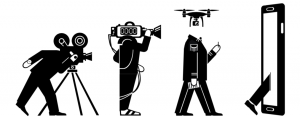One of the goals I originally envisioned for this residency was to do more reading; to immerse myself in subjects and theories as I rarely have. It didn’t happen as much as hoped, but now I am making up for lost time with a vengeance. Next month, I will teach two block seminars in the Media Studies department at the Goethe Universität in Frankfurt. Since I’ve been using up a significant portion of my final week at the residency working on the descriptions for these courses, I’ll share them here.
Seminar 1: The Lives of Images
Images are everywhere around us. We encounter them almost constantly in various situations and states of mind. We engage them for various purposes: to receive or give information; to feel an emotional response; to be stirred into action or reaction. We often take images for granted at this functional level, instead of reflecting on the interactions they facilitate, the lives they show and the stories they tell. But what if the key stories are not told not through, but about these images? What if one of the essential lives depicted by an image is that of itself?
This course explores the possibility to understand various forms of visual media (photography, painting, film and video) as beings with lifespans, and what can be learned from this proposition. As anyone who uses Instagram knows, we often engage images by applying filters to enhance our appreciation of them. This class will apply a more foundational set of filters to regard images, using historical, cultural, political, industrial, technological, economic and ecological contexts to deepen our understanding of how we create, view and disseminate images. It is no coincidence that these same filters can be applied to understanding the conditions that inform the lives of human beings. This begs the question not only of what we can learn of our lives through studying images as living entities, but on what basis we can distinguish the lives of images from our own.
This four-week course will pursue these questions intensively through a combination of readings, viewings, discussions, and most crucially, active research and presentation. We will study the conditions that led to the creation of a work of visual media, then trace the journey of that media as it circulates and is used and re-used to different, at times contradictory purposes. We will learn about the institutional and ideological forces that shape the journey of images, and what agency or power an image may hold in determining its own fate. For their final project, students will select one visual work and perform a comprehensive investigation of its life history through various contexts. Students will present their research either in written or audiovisual form.
Through this course students will develop critical skills and techniques for the thorough, resourceful and responsible investigation of media. Students will also study important theoretical frameworks through readings and viewings of key works. Ultimately, students will not only improve their ability to tell stories through images, but understand the underlying stakes of doing so.
Seminar 2: Virality: Social Media Economies and Ecologies
“Going viral” is a term familiar to anyone engaged with contemporary internet and social media culture, but what does it mean exactly? How did a term derived from language historically related to disease and plague become associated with popularity, power and success in the digital era? The answer can be traced to the mid-1990s, an era signified by the rise of three global phenomena: hypercaptialism, the Internet and fears of pandemics. These phenomena are not only interconnected but each reflect larger themes, respectively: economy and industry; technology and culture; biology and ecology. All of these themes contribute to a complex understanding of virality in today’s social media. The “Viral” emerges as a dominant social ideology that informs social media’s functions: as interpersonal communication, entertainment, journalism, and activism (all of which themselves have become increasingly interconnected).
This four week course will explore the concept of “virality” as a way to diagnose the ideologies and effects of contemporary social media and digital technology. We will link these phenomena to analogical frameworks of understanding, most notably economy (i.e. systems realized through the production, distribution and consumption of goods and services) and ecology (i.e. systems realized through relations of organisms to one another and their environment). These two systems intersect at the site of the virus, an agent that exists somewhere between the organic and inorganic.
This course will pursue these questions intensively through a combination of readings, viewings, discussions and presentations. Texts will be drawn from key works of critical theory as well as contemporary journalism and marketing literature. Viewings will include films, television programs and online videos relating to the viral. Contemporary social media platforms such as Facebook, YouTube, Instagram, Twitter and Snapchat will be investigated and evaluated for how they respectively play host to viral phenomena. For the final project, students will be expected to produce original research on social media and virality, either through investigating a contemporary viral social media phenomenon, or by conducting their own social media viral experiment. Through these engagements, students will emerge from the course with a deeper understanding of key forces driving contemporary online culture, while critically envisioning their own roles as agents in this environment.
